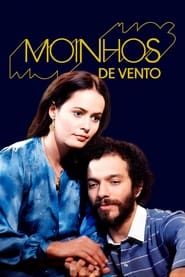Tv Globo TV Series - Page 19
-
Na Moral
2012
star 8Na Moral is a Brazilian talk show broadcast by Rede Globo since July 5 2012 and hosted by Pedro Bial. The show includes the participation of three people which complement the theme, 50 people in a audience and a DJ. -
Obrigado, Doutor
1981
Obrigado, Doutor
1981
-
Presença de Anita
2001
star 7.7Written by Manoel Carlos, “The Presence of Anita” is an amazing story about love, passion and the traps of destiny. Anita is an angel faced teenager who seduces a writer, destroying his family and his life. According to her, nothing is coincidence. Destiny is already written and she cannot change her fate. -
Divertics
2013
Divertics
2013
-
Xou da Xuxa
1987
Xou da Xuxa
1987
-
Vídeo Show
1983
star 6Vídeo Show is a long-running Brazilian TV program on Globo TV. From its debut in 1983 to 1994, the show aired weekly. Since then, it has been airing from Monday to Friday at 1:45 pm, following the lunchtime news, Jornal Hoje and being one of the most-watched afternoon shows. Currently hosted by the actor André Marques, its format is that of a daily "electronic magazine", where the network's backstages are shown, with on-set and behind-the-scenes footage on Globo's series and telenovelas, including bloopers, interviews with the actors, directors and authors, funny segments with scenes from soaps, and old videos from the network's archives. At the end of the show, there is the Vídeo Game segment, consisting on a week-long game show hosted by Angélica, where actors, divided into two teams, must answer questions and complete funny tasks related to the network's current and/or past shows. The winner team is announced on Friday, and donates the prize to a charity of their choice. The openin -
Popstar
2017
star 5Celebrities participate in a live singing competition, judged by musicians and other personalities. -
Moinhos de Vento
1983
Moinhos de Vento
1983
-
Stone Circle
2008
star 7.3Stone Circle takes place in São Paulo in 1958, and tells the story of a love triangle between Natércio (Daniel Dantas), Laura (Ana Paula Arósio) and Daniel (Marcello Antony). Laura is married to Natércio and has two daughters with him: Bruna (Anna Sophia Folch) and Otávia (Ariela Massotti). Emotionally unstable, sensitive, fragile and delicate, she has frequent crises and is treated by Dr. Daniel, because who ends up falling in love. This leads to jealousy in the husband, who, despite loving his wife very much, is controlling and ambitious. Laura has a daughter with doctor Daniel, Virginia (Tammy Di Calafiori), who is raised by her mother with the lawyer. The Silva Prado mansion, where Natércio and Laura live, is located in the upper-middle-class Jardim Europa neighborhood and is looked after by the housekeeper Frau Herta (Ana Beatriz Nogueira), who is secretly in love with her boss and tries to destroy everything she does well. to Laura. -
Dancinha dos Famosos
2007
Dancinha dos Famosos
2007
-
O Outro
1987
O Outro
1987
-
Deus Salve o Rei
2018
star 4An heir to a throne in love with a commoner. An inconsequential prince, who thinks only of taking advantage of royal patronage. An ambitious princess, capable of everything to get what she wants. -
O Dentista Mascarado
2013
O Dentista Mascarado
2013



















